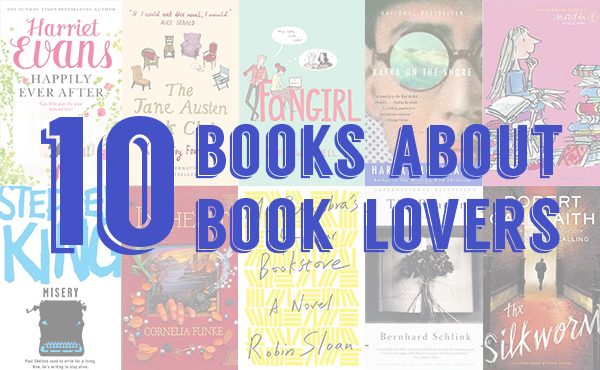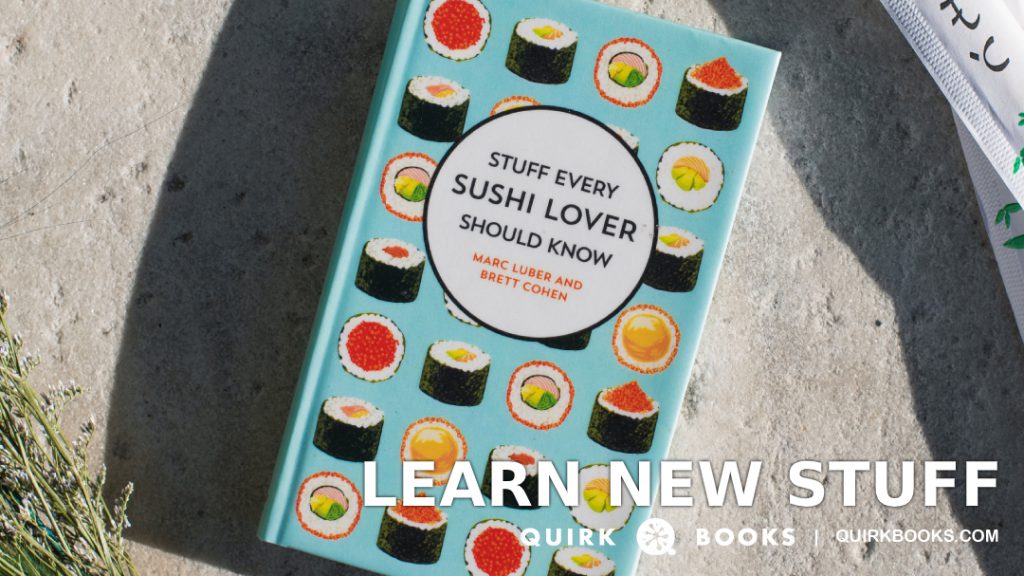10 Books About Book Lovers
Posted by
Megan Tripp
Book lovers believe that books are magic, authors are wizards, and readers are…also wizards? Okay, that metaphor died a little, but you know what I mean.
Chances are, if you clicked on this post, you identify as a book lover and you want to read books about fellow book lovers. Below is a list of your next ten must-reads, from YA to New York Times bestsellers.

Happily Ever After by Harriet Evans: Elle finds comfort in books both as a teenager with parents in the midst of a separation, and as an unemployed twenty-something crashing on a friend’s couch. We follow Elle’s life from a glance at a misprinted ad for an assistant editor position at Bluebird Books to a position high up in a New York publishing company, with a few men sprinkled in along the way. Despite the clichéd coming-of-age storyline, something about Evans’ prose makes it sparkle with originality. As my well-worn, coffee-stained copy will attest to, I can’t help coming back to this one again and again.
The Jane Austen Book Club by Karen Joy Fowler: The Jane Austen Book Club follows the lives of five California women and one man who turn to the queen of social commentary and romance at turning points in their lives. With characters like a twenty-something lesbian, a mother of three, a depressed schoolteacher, a misguided IT guy, and an eccentric divorcee (four times over), Fowler proves that Jane has an answer for everyone. You may be more familiar with the movie version, which features the incomparable Emily Blunt, but as is usually the case, the book is always better. Karen Joy Fowler channels her inner Austen and so do her characters in this complicated, nuanced portrait of the human condition.
Fangirl by Rainbow Rowell: Rainbow Rowell expertly captures the Potterhead generation’s obsession with fantasy and the culture of fanfiction that they’ve inspired in her book Fangirl. College freshman Cather and her twin sister Wren view college in two very different ways. While Wren parties every night and bonds with her new roommates, Cather is more concerned with her finishing her fanfiction novel. She hits more than a few bumps in the road, as any college freshman does, but Cather’s love of writing and reading grounds her in a time of familial tension and serious boy problems. If you’re a Rowell fan after finishing this, her other bestseller, Eleanor & Park, is also a must-read.
Misery by Stephen King: On a much darker note, the chilling Annie Wilkes, from the Stephen King classic, Misery, is the ultimate fangirl gone bad. When bestselling author Paul Sheldon crashes his car due to a mixture of alcohol and ego, Annie saves him from freezing to death. Once she recognizes him as the author of her favorite book series, she insists on holding him hostage and personally nursing him back to health – which involves getting him addicted to pain killers and crushing his outer extremities. Paul quickly learns in the grueling winter that follows that Annie is more volatile than a writer’s sensitive temperament, and her manic depressive state has a body count.
Matilda by Road Dahl: In the list of bookworms, I would be remiss not to mention the adorable Matilda. While the movie with Rhea Pearlman, Danny DeVito, and Mara Wilson pretty much defined my childhood, Dahl’s original book put more emphasis on the power of books. Matilda is less a supernatural force and more a miraculous child due to her intellectual ability. Books are the source of her power and ultimately lead to her freedom from abusive parents, a bullying headmistress, and everyone else who didn’t believe in books they way she does. Matilda gives children everywhere hope in the power of books to change your life.

Kafka On The Shore by Haruki Murakami: Books and magic are often closely intertwined for readers and Murakami’s Kafka on the Shore seamlessly blends reading with government conspiracy, magic, and sexual awakening. The protagonist, fifteen year old Kafka, runs away from home and ends up in a grand private library in an unfamiliar city where he learns about love, sex, and what it means to grow up. This world may sound normal, but all around Kafka, fish fall from the sky, cats talk, children have sudden unexplained bouts of narcolepsy, and ghosts abound.
Inkheart by Cornelia Funke: Cornelia Funke takes a literal approach to the idea that characters in books can leap off the page. Meggie’s father has the ability to pull characters out of books and implant them in the real world. When he accidentally releases a handful of magical and dangerous characters, and traps Meggie’s mother in their book, he and Meggie must work with the released characters to try to put everyone back where they belong. Funke’s two sequels to Inkheart aren’t bad as far as sequels go, but the original battle between good and evil in the first book is unforgettable.
Mr. Penumbra’s 24-Hour Bookstore by Robin Sloan: I originally picked up this book because I loved the idea of a bookstore that never closes. Little did I know that I’d be immersed in a world where computers, ebooks, magic, independent bookstores, and secret cults of bibliophiles come crashing together in an explosion of awesome! Sloan seamlessly blends two opposing worlds (independent bookstores and the age of technology) in this story about an unemployed graphic designer who gets a job in a bookstore that never closes.
At first, our protagonist just tries to create a digital rendering of the shop in order to track the large lending library at the back of the store, which he dubs the Waybacklist, but he accidentally solves an ancient puzzle and stumbles into a secret cult of book lovers. It has all the mystery and magic of a fantasy novel, but Sloan tells it with such a familiar tone, it feels less like fiction and more like that one possibly hyperbolic story your cousin always tells at Thanksgiving.
The Silkworm by Robert Galbraith: Any book lover who has ever fantasized about one day writing a book of their own has imagined what it would be like to see that book come to life. Unfortunately for book lover and author Owen Quine in JK Rowling’s latest mystery detective novel, seeing his book come to life means facing a gruesome death. Rowling’s protagonist, private eye Cormoran Strike, must read Quine’s latest unpublished novel and figure out which characters in the book correspond to which suspicious real-life characters in Quine’s circle of family and friends. Rowling paints a murderous version of our idealized perception of the publishing world that is full of lies, betrayals, and bestsellers.
The Reader by Bernard Schlink: Michael Berg’s unlikely relationship with an older woman named Hanna in post-World War II Germany leads to an awakening in more ways than one. As a child, throughout their relationship he reads aloud to her and she teaches him what it means to love someone. As a law student later in life, long after the two have lost touch, Michael discovers why reading is so important to Hanna and about the power of books to save and destroy lives. I can’t say much more without giving away major plot points, but Schlink’s take on war crimes, nuanced human relationships, and the power of the written word is haunting.




